人教版八年级英语下册unit4教案
人教版八年级英语下册教案(RJ) Unit 4

Unit 4Why don't you talk to your parents?第一课时Section A (1a-2d)1.重点单词:allow,wrong,guess,deal2.重点短语:write him a letter,talk about,look through,work out3.重点句式:Why don't you talk to your parents?My parents don't allow me to hang out with my friends.I got into a fight with my best friend.What's wrong?I don't want to surprise him.I don't want to talk about it on the phone.I had a fight with my best friend.You should call him so that you can say you are sorry.I found my sister looking through my things.But why don't you forget about it so that you can be friends again?Although she is wrong,it's not a big deal.Hope things work out.1.重点短语和句型2.用Why don't you...?向他人提出建议1.重点短语和句型2.用Why don't you...?向他人提出建议一、预习课本P25-26新单词并背诵,完成下面的汉译英。
1.允许____________ 2.错误的____________3.猜测____________ 4.协议____________二、认真预习1a-2d找出下列短语和句型。
初中英语人教新目标版八年级下册 Unit 4 Section B 教案

Unit 4Why don’t you talk to your parents?1. Talk about the problems.2. Learn the new language points.1. The differences of“cut up , cut off, cut out”.2. The usage of“compare. . . with. . . ”.现如今父母与青春期孩子们之间的矛盾越来越多, 有的孩子经常对父母发火, 甚至几天不说话。
请以“How to get along well with parents”为题, 阐述父母与孩子间产生矛盾的原因, 以及改善关系的解决措施。
词数: 100词左右。
要点可以包括:1)产生矛盾原因: 父母过分关注分数; . . .2)改善关系的措施: 多交流; . . .How to get along well with parentsNowadays, more and more teenagers can’t get along well with their parents. They often get mad at their parents and some of them even don’t talk with their parents for several days. Why does the relationship between teenagers and parents get so bad? Here are some reasons.First, much attention is paid to teenagers’ grades in exams by parents. They only want to see their kids studying all the time without having a rest or having their own time. Second, both teenagers andparents don’t spend much time in communicating with each other. Parents are always busy with their work. They even don’t understand each other.How to make the relationship better? The followings are the ways to solve this problem. First of all, parents are supposed to spend more time with their f amily. It’s important to take some time to communicate if there are some problems. Besides, both parents and teenagers should find a right way to express their love and talk about their own thoughts to each other. All the problems can be solved by love and understanding.I hope the relationship between parents and teenagers can be good at any time. If both of them would like to spend time and efforts in how to solve the problems between them, they will have a happy and wonderful life together.本课时从一开始即给了学生明确的教学任务, 达到开门见山的效果, 让学生学习的目标性更强, 小组练习的方式也能加强学生对知识点的巩固。
2020-2021学年人教版英语八年级下册Unit4SectionA1a—2d教案
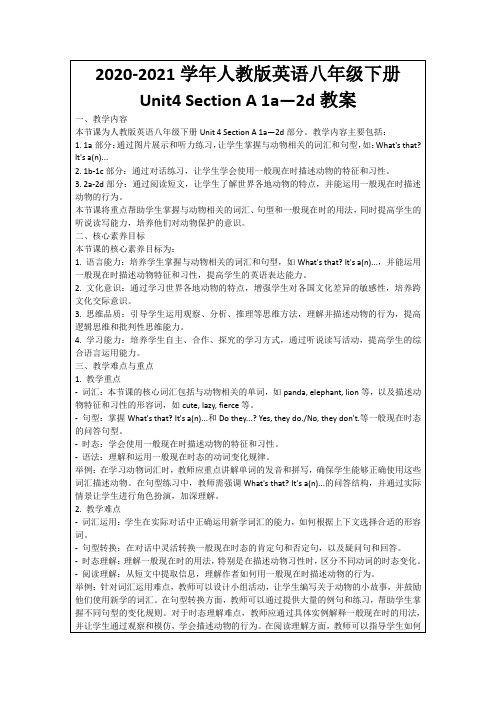
本节课的核心素养目标为:
1.语言能力:培养学生掌握与动物相关的词汇和句型,如What's that? It's a(n)...,并能运用一般现在时描述动物特征和习性,提高学生的英语表达能力。
2.文化意识:通过学习世界各地动物的特点,增强学生对各国文化差异的敏感性,培养跨文化交际意识。
3.思维品质:引导学生运用观察、分析、推理等思维方法,理解并描述动物的行为,提高逻辑思维和批判性思维能力。
4.学习能力:培养学生自主、合作、探究的学习方式,通过听说读写活动,提高学生的综合语言运用能力。
三、教学难点与重点
1.教学重点
-词汇:本节课的核心词汇包括与动物相关的单词,如panda, elephant, lion等,以及描述动物特征和习性的形容词,如cute, lazy, fierce等。
2020-2021学年人教版英语八年级下册Unit4 Section A 1a—2d教案
一、教学内容
本节课为人教版英语八年级下册Unit 4 Section A 1a—2d部分。教学内容主要包括:
1. 1a部分:通过图片展示和听力练习,让学生掌握与动物相关的词汇和句型,如:What's that? It's a(n)...
五、教学反思
在今天的教学过程中,我发现学生们对于动物词汇的学习非常感兴趣,他们积极参与到课堂活动中,踊跃回答问题。通过图片和实际情景的展示,学生们能够更好地记忆和理解新词汇。然而,我也注意到,在运用一般现在时态描述动物特征和习性时,部分学生还存在一定的困难。
首先,对于词汇的掌握,我认为可以继续采用图片、实物等直观教具,帮助学生加深印象。同时,结合课后作业,让学生多读、多写,巩固所学词汇。
人教版初中八年级英语下册第四单元Unit 4 教案含教学反思

Section A 单词allow v.允许;准许wrong adj.有毛病;错误的guess v.猜测;估计deal n.协议;交易relation n.关系;联系;交往communication n.交流;沟通argue v.争吵;争论cloud n.云;云朵elder n.年纪较长的instead adv.代替;反而;却whatever pron.任何;每一nervous adj.焦虑的;担忧的offer v.主动提出;自愿给予proper adj.正确的;恰当的secondly adv.第二;其次communicate v.交流;沟通explain v.解释;说明clear adj.清楚易懂的;晴朗的copy v.抄袭;模仿;复制;复印return v.归还;回来;返回anymore adv.(常用于否定句和疑问句句末)再也(不);(不)再短语look through快速查看;浏览big deal重要的事work out成功地发展;解决get on with和睦相处;关系良好句型1.Many of them are learning exam skills so that they can get into a good high school and later a good university.他们中很多人正在学习应试技巧以便能考入一所好高中,进而升入一所好大学。
2.The Taylors are a typical American family.泰勒家就是一个典型的美国家庭。
3.And they are always comparing them with other children.而且她们总是将自己的孩子和别的孩子相比较。
语法although, so that及until引导的状语从句知识目标掌握课文中的重点词汇及相关短语,并灵活运用。
能力目标学会谈论问题和给出建议情感目标遇到问题要主动地去和家人、朋友或亲近的人交流;如果身边的人遇到问题,能主动提供帮助;要学会放松、缓解压力。
人教版八年级下册英语教案unit4
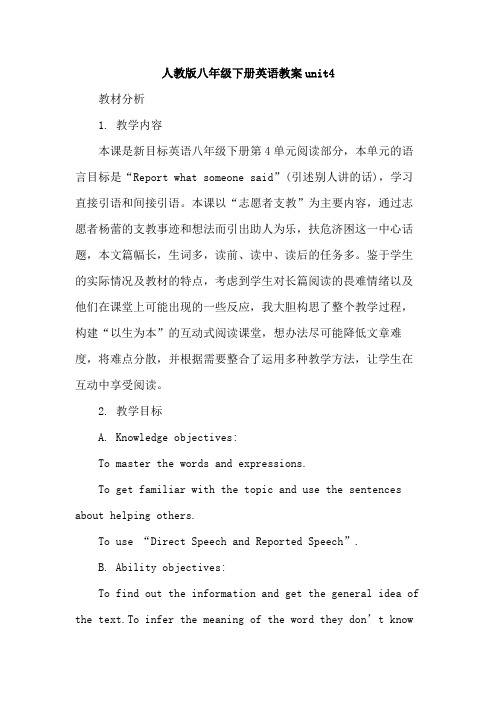
人教版八年级下册英语教案unit4教材分析1. 教学内容本课是新目标英语八年级下册第4单元阅读部分,本单元的语言目标是“Report what someone said”(引述别人讲的话),学习直接引语和间接引语。
本课以“志愿者支教”为主要内容,通过志愿者杨蕾的支教事迹和想法而引出助人为乐,扶危济困这一中心话题,本文篇幅长,生词多,读前、读中、读后的任务多。
鉴于学生的实际情况及教材的特点,考虑到学生对长篇阅读的畏难情绪以及他们在课堂上可能出现的一些反应,我大胆构思了整个教学过程,构建“以生为本”的互动式阅读课堂,想办法尽可能降低文章难度,将难点分散,并根据需要整合了运用多种教学方法,让学生在互动中享受阅读。
2. 教学目标A. Knowledge objectives:To master the words and expressions.To get familiar with the topic and use the sentences about helping others.To use “Direct Speech and Reported Speech”.B. Ability objectives:To find out the information and get the general idea of th e text.To infer the meaning of the word they don’t knowfrom the context.C. Affective objectives:Students are to realize the importance of helping others and they are encouraged to help others.Students’ team spirit will be improved by completing a certain task together.By understanding the life in rural areas, students are to realize how happy they are.3. 教学策略:(1)兴趣激发策略。
人教版英语八年级下册Unit4听说课教案

(设计意图:通过让学生以小组活动的形式结合自身的情况,用2b的语料讨论如何处理与朋友之间的矛盾,对2b进行听前预测。)
Step2While-listening
1.Work on2a.Peter’s friend is giving him advice. Fill in the blanks with could or should.Then check the answers.
计
Unit 4
Why don’t you talk to
your parents?
SectionA(1a-2d)
教
学
反
思
年级学科:八年级英语学科 任课教师:
Unit4课题:Why don’t you talk to your parents?
日期:2021年 月 日
课型:听说课SectionB(1a-1e)
(设计意图:通过呈现小女孩Alice因为数学考试而苦恼的动画,引出本单元话题,并通过讨论学生们平时在学校和生活中存在的问题,激发学生探究问题的欲望,增强学习兴趣。)
(设计意图:呈现1a中的词组并带出句型“What’s the matter?/ What’s the wrong?并在此过程中教授新单词和词组。)
Unit4课题:Why don’t you talk to your parents?
日期:2021年 月 日
课型:听说课SectionA(1a-2d)
主备人:
教学目标
1.词汇:allow, wrong, guess, deal, look through, big deal, work out
人教版八年级下册英语unit4教案及教学反思

人教版八年级下册英语unit4教案及教学反思全文共3篇示例,供读者参考篇1Unit 4 of the People's Education Press Eighth Grade English textbook is focused on the theme of "Hobbies". This unit aims to help students talk about their own hobbies and interests, as well as learn how to express preferences and opinions.Teaching Objectives:1. Enable students to talk about their hobbies and interests in English.2. Introduce vocabulary related to different hobbies.3. Teach students how to express preferences and opinions.4. Improve students' listening, speaking, reading, and writing skills.Teaching Procedures:1. Warm-up activity: Start the lesson by asking students to share their hobbies with the class. This will help to activate their prior knowledge and create a positive learning atmosphere.2. Vocabulary introduction: Introduce key vocabulary related to hobbies, such as "painting", "cooking", "playing sports", etc. Use pictures, gestures, and realia to help students understand and remember the new words.3. Listening comprehension: Play a listening passage where people talk about their hobbies. Students listen and then answer comprehension questions to check their understanding.4. Speaking practice: Divide the class into pairs or groups and ask them to discuss their own hobbies, using the vocabulary they have learned. Encourage students to ask questions and share their opinions with each other.5. Reading activity: Give students a reading passage about different hobbies and ask them to identify key information, such as the benefits of each hobby and how to get started.6. Writing task: Ask students to write a short paragraph about their favorite hobby, describing why they enjoy it and how it makes them feel. Provide feedback on their writing to help improve their language skills.7. Role-play activity: Divide students into pairs and give them a role-play scenario where they discuss their preferencesfor different hobbies. This will help them practice expressing opinions and using the target vocabulary.8. Review and assessment: End the lesson with a review of key vocabulary and concepts covered in the unit. Administer a quiz or speaking activity to assess students' understanding and progress.Teaching Reflection:Overall, teaching Unit 4 on Hobbies was engaging and effective. The activities helped students practice speaking, listening, reading, and writing skills in a fun and interactive way. However, one area for improvement is to provide more opportunities for students to use the target language in real-life contexts. For example, incorporating project-based learning tasks where students create a hobby-themed presentation or video could further enhance their language proficiency.In conclusion, Unit 4 provided a valuable opportunity for students to explore their interests and hobbies in English. By incorporating a variety of activities and assessments, teachers can help students achieve the learning objectives and improve their English language skills.篇2Unit 4 of the People's Education Edition eighth grade English textbook covers the topic of "Wild Animals". In this unit, students will learn vocabulary related to wild animals, practice reading and listening skills through various texts, and improve their ability to describe animals and discuss their habitats.Lesson 1:- Warm-up: Start the lesson by asking students to name different wild animals they know.- Vocabulary: Introduce new vocabulary words related to wild animals such as lion, elephant, tiger, etc.- Reading: Read a short passage about different wild animals and ask students comprehension questions.- Listening: Play a recording of different animal sounds and ask students to match the sound with the correct animal.- Speaking: Have students describe their favorite wild animal and why they like it.Lesson 2:- Warm-up: Review the vocabulary words from the previous lesson by playing a matching game.- Reading: Read a longer passage about a safari trip and ask students to identify the animals mentioned in the text.- Grammar: Introduce comparatives and superlatives using examples related to wild animals (e.g. The elephant is bigger than the giraffe).- Speaking: Have students work in pairs to discuss which animal they think is the most interesting and why.Lesson 3:- Warm-up: Play a game of charades where students act out different wild animals for their classmates to guess.- Reading: Read a passage about endangered animals and discuss why it is important to protect them.- Writing: Have students write a short paragraph about what they can do to help protect endangered animals.- Speaking: Conduct a class debate on whether or not zoos are good for wild animals.Lesson 4:- Warm-up: Review the vocabulary and grammar concepts learned in the previous lessons through a quiz.- Project: Have students work in groups to create a poster about a specific wild animal, including information about its habitat, diet, and interesting facts.- Presentation: Have each group present their poster to the class and answer questions from their classmates.Teaching Reflection:Overall, the unit was engaging and interactive for students. The variety of activities helped to keep students interested and motivated throughout the lessons. The vocabulary and grammar concepts were presented in a clear and concise manner, allowing students to grasp the new material easily. The project at the end of the unit provided students with an opportunity to apply what they had learned and showcase their creativity. However, I would like to incorporate more opportunities for students to practice speaking and listening skills in future lessons to further develop their language proficiency.篇3Unit 4 of the eighth-grade textbook by People's Education Press focuses on the theme of "Wild animals". In this unit, students will learn about various wild animals and their habitats, as well as the importance of wildlife conservation.The unit is divided into several sections, including reading, listening, speaking, and writing tasks. The reading passages describe different wild animals such as lions, elephants, and pandas, providing students with essential information about these creatures. The listening activities help students improve their listening skills by practicing comprehension and understanding spoken English. Speaking tasks encourage students to express their opinions and share information about wild animals with their peers. Writing tasks require students to write short paragraphs or essays about their favorite kind of wild animal or the importance of wildlife conservation.To begin the unit, teachers can introduce the topic of wild animals by showing pictures or videos of different types of wildlife. This can generate interest and curiosity among students, prompting them to learn more about these fascinating creatures. Teachers can also engage students in group discussions or debates about wildlife conservation and the impact of human activities on the environment.During the reading and listening activities, teachers should provide support and guidance to students as they work through the text and audio materials. Encouraging students to ask questions, make predictions, and summarize key points can helpthem better comprehend the information presented. Teachers can also incorporate vocabulary-building exercises, such as word matching or crossword puzzles, to reinforce new words and concepts.For the speaking and writing tasks, teachers can encourage students to use creative expression and critical thinking skills. Providing opportunities for role-playing, storytelling, and collaborative writing can enhance students' language abilities and boost their confidence in using English. Teachers can also assign group projects or presentations that require students to research and present information about specific wild animals or conservation efforts.In conclusion, Unit 4 of the eighth-grade textbook by People's Education Press offers a comprehensive and engaging exploration of wild animals and wildlife conservation. By incorporating a variety of teaching strategies and activities, teachers can facilitate students' learning and language development in a meaningful and enjoyable way. Through active participation and interaction, students can deepen their understanding of the natural world and cultivate a sense of responsibility towards protecting our environment and its inhabitants.。
人教版英语八年级下册教案:Unit4 Why don’t you talk to your pare

Unit4 SectionA〔1a-2d〕教案1.0Teaching Analysis教情分析1.1Teaching Objectives 教学目的1.1.1Language goals 语言目的allow, wrong, guess, deal, allow sb.to do sth., get into a fight with, be angry with, work out, call sb. up, surprise sb., give sth. back, be good at, although, hang out with, have a fight with, wait that long, talk about1) What’s the matter? P252) What’s wrong? P253) My parents don’t allow me to hang out with my friends. P254) I got into a fight with my best friend? P255) You should call him up. P266) I don’t want to talk about it on the phone. P267) What should I do? P268) But why don’t you forget about it so that you can be friends again? P269) Hope things work out. P2610) I guess you could tell her to say sorry. P2611) I found my sister looking through my things yesterday. P261) I have to study too much so I don’t get enough sleep. P26 (so 作连词,意为“因此,所以〞,表示因果关系。
人教版八年级下册第四单元Why don't you talk to your parents 教案

人教版八年级下册Unit 4 Why don’t you talk to your parents ?Section A 3a-3c教学重难点教材分析1.教学内容分析本课例的教学内容是人教版八年级下册Unit A 3a-3c,课型为阅读课。
本单元的话题是Family Relations,功能是Talk about problems and give advice, 基本结构有:You should …Why don’t you … ? Maybe you could …本课所选的Section A 3a是两封简短的信,第一封是一个笔名为Sad and Thirteen的女孩向她的老师Mr Hunt 写的求助信。
第二封是Mr Hunt给她提出的建议。
两封信在篇章结构和语言组织上有共同的特点:信的首句为主题句;使用不同的句式来谈论问题和提出建议;使用恰当的连词连结句子,语言紧凑连贯。
2.学生分析我校是农村学校,师资水平和城里的学校比,有一定的差距。
中学生的英语水平不如城里的学生,但是高于其他偏远学校中学生的英语水平。
本节课的话题为家庭关系,与学生的实际生活紧密相关,每个学生的家庭或多或少都有这样或那样的问题,经历相似,因而有话想说,有话可说。
【教学目标】基于对教学内容和学生情况的分析,本课预设了以下目标:1.掌握文中的词汇relation 、communication、argue 、refuse、nervous 、get oninstead、explain 和secondly的用法;2.在语境中感知、理解和运用不同句式描述问题和给出建议;3.学习和掌握阅读策略,根据话题对文章的内容进行预测,通过理解首句快速提炼文章的主旨大意,通过查找关键词迅速地切入文章内容。
4.在预测中充分想象和表达;正确判断教师和同学们的建议;根据信息的逻辑关系进行分析和判断,逐步形成多元思维的习惯。
5.根据短文的文本特征让学生进行仿写练习,恰当运用主题句和连词陈述自己的问题并对他人的观点提出疑点并表达自己的观点6.认识到每个人在成长的过程中总会遇到这样那样的问题,关键是如何面对,积极寻找解决问题的办法。
人教版八年级英语下册Unit4 写作课教学设计(公开课教案)

Unit4 Why don’t you talk to your parents.写作课教学设计Teaching aims:Knowledge aims:Students could get familiar with after-school class and can express their opinions about it.Ability aims:Students will improve their writing and speaking abilities.Students will be able to collect writing materials and organize them according to one point.Emotional aims:Learning this lesson, students will know how to express their opinions logically.Students will learn to consider problems objectively and rationally.Teaching key points and difficult points:Key points:Students can make notes while discussion and arrange their arguments.Difficult Points:Students will learn to consider problems objectively and rationally.Teaching procedures:Step 1 Lead-in1.Greet students.2.Ask students questions “After school, what activities do you usually do?” and show some pictures about activities such as play basketball, play the piano and paint. Students will respond this question actively. In this way, I will lead to today’s topic “ your opinion on after-school classes for children”.(Justification: The question is closely related with the current situation of them and they would actively give answers. The teacher can lead the topic very naturally and it can also arouse students’ interest.)Step 2 Pre-writing1.Debate: Divide students into 2 groups and have a debate about “Your opinions on after-school class for children” One opinion is children should have after-school class because…/ The other opinion is children should not have after-school class because…. While the debate, the teacher will remind students to make notes of the reasons and then conclude the two opinions with students.eful expressions: ask students to pay attention to some conjunction words, such as firstly, then, in a word. And some sentence structures: I don’t really agree with... because...3.Outlining: Ask students to read 3b in the book, and illustrate the formation of letter.(Justification: through debating, students will have the material to write the letter. Through expression learning, the letter will be more logically. This part will lay a foundation for the following writing steps.) Step 3 While-writingDrafting: Ask students write a letter to the magazine to express their expressions on after-school class for children. Give students 15 minutes to write a draft.(Justification: Through writing by themselves, students’ writing ability will be improved.)Step 4 Post-writing1. Peer editing: After the drafting, ask students to check their articles with desk mates. They should read the passage and check the ideas or the logical development. Also, check carefully the grammar, spelling and punctuation of their writings.2. Ask several students to read their passages and then give someevaluations from the advantages and disadvantages.Then ask students to revise their articles according to the evaluations(Justification: The peer editing will help them find the mistakes about spelling , the grammar and the logic, which is a way to learn by themselves. They also learn the advantages and disadvantages from others. ) Step 5 Summary and homeworkSummary:Ask students to act as an assistant teacher to conclude what we have learned this class. And then the teacher will make some supplements.Homework:Do an interview: Ask your family members about their expressions on after-school class for children. And tell your parents your opinions about after-school class.Blackboard design:Expressions on after-school classDear XX,Children should have after-school class/ Children should not haveafter-school classFirstly,Then,In a word,Yours,XXX。
人教版八年级下英语第四单元unit4教案及练习

Unit4He said I was hard-working.1.Fill in the blanks with the words given.happen bring copy borrow pass on复制抄袭1.Can you some music CDs to the party?2.It’s not right for you to others’homework.3.He didn’t know what was outside.4.I’m so cold.Can I your jacket?5.I’m seeing Sue this afternoon.Do you want meto any messages?2.Read the story and then write it as a conversation.My best friend is Xiao Li,but last week in school we had a big fight,and she didn’t talk to me.It all started when she ask ed me if she could copy my homework.I ask ed her why she wanted to do that,and she said that she had forgotten to do hers.I said I didn’t think it was a good idea for her to copy my homework.She wanted to know why I didn’t think it was a good idea.I said it would start a bad habit,and that she should do her own work.She got really mad at me,and said she didn’t want to be my best friend anymore.I said that was OK and that I was sure she would get over it.And she did.Y esterday she told me she was sorry.She said it was mu ch better if she did her own workhers她的(名词性物主代词)own自己的get over克服;忘掉;原谅Language Points1.I ask ed her why she wanted to do that,and she said that she had forgotten to do hers.我问她为什么要那么做,她说她忘记做作业了。
人教版英语八下Unit 4 Section A(3a-3c)教案设计
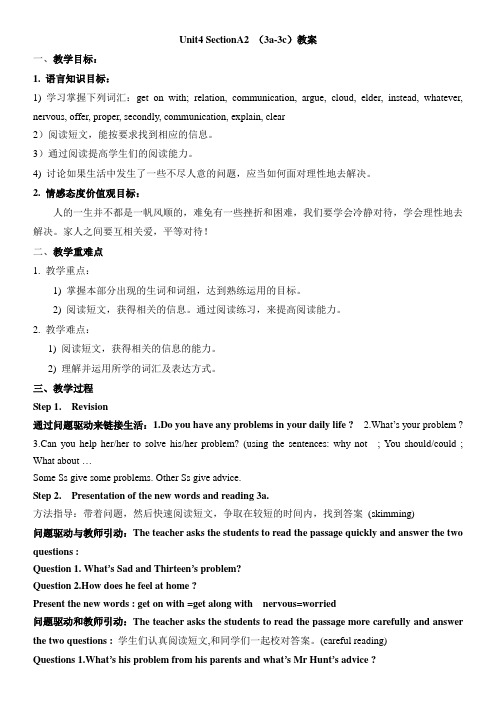
Unit4 SectionA2 (3a-3c)教案一、教学目标:1. 语言知识目标:1) 学习掌握下列词汇:get on with; relation, communication, argue, cloud, elder, instead, whatever, nervous, offer, proper, secondly, communication, explain, clear2)阅读短文,能按要求找到相应的信息。
3)通过阅读提高学生们的阅读能力。
4) 讨论如果生活中发生了一些不尽人意的问题,应当如何面对理性地去解决。
2. 情感态度价值观目标:人的一生并不都是一帆风顺的,难免有一些挫折和困难,我们要学会冷静对待,学会理性地去解决。
家人之间要互相关爱,平等对待!二、教学重难点1. 教学重点:1) 掌握本部分出现的生词和词组,达到熟练运用的目标。
2) 阅读短文,获得相关的信息。
通过阅读练习,来提高阅读能力。
2. 教学难点:1) 阅读短文,获得相关的信息的能力。
2) 理解并运用所学的词汇及表达方式。
三、教学过程Step 1. Revision通过问题驱动来链接生活:1.Do you have any problems in your daily life ? 2.What’s your problem ?3.Can you help her/her to solve his/her problem? (using the sentences: why not ; You should/could ; What about …Some Ss give some problems. Other Ss give advice.Step 2. Presentation of the new words and reading 3a.方法指导:带着问题,然后快速阅读短文,争取在较短的时间内,找到答案(skimming)问题驱动与教师引动:The teacher asks the students to read the passage quickly and answer the two questions :Question 1. What’s Sad and Thirteen’s problem?Question 2.How does he feel at home ?Present the new words : get on with =get along with nervous=worried问题驱动和教师引动:The teacher asks the students to read the passage more carefully and answer the two questions :学生们认真阅读短文,和同学们一起校对答案。
人教版八年级英语下Unit 4 初中八年级下册英语教案教学设计课后反思
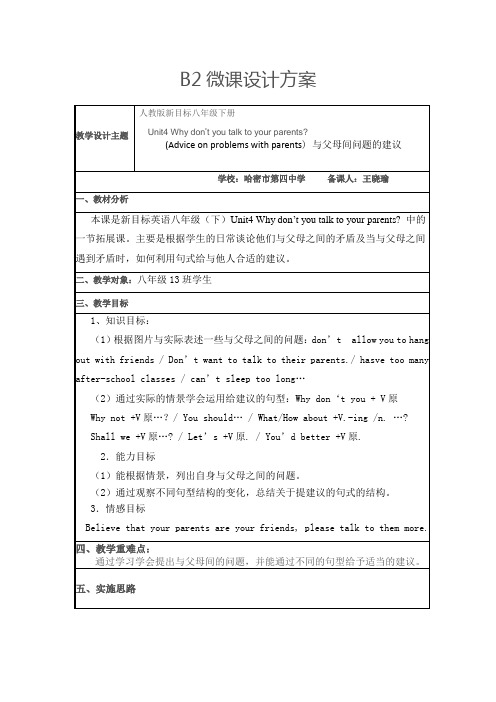
Step6.Feedback
Do some exercises.
1. Why not ______ her a scarf?
A. get B. to get C. getting D. gets
2. A nice day, isn’t it?
Yes, _____going for a picnic and relax ourselves?
A. Would you like B. Why not
C. What about D. why don’t
3.为什么你不跟你父母道歉呢?
____ ____ _____ say sorry to your parents?
4. Why don’t you read more books?(同义句转换)
Step2Let’s Watch
1.Watch a video together about a little boy’s life.
2.Afterwatching,talk about the problems the boy met with his parents and feelings.
Step3Let’s Talk
二、教学对象:八年级13班学生
三、教学目标
1、知识目标:
(1)根据图片与实际表述一些与父母之间的问题:don’t allow you to hang out with friends/Don’t want to talk to their parents./hasvetoo many after-schoolclasses/can’t sleep too long…
B2微课设计方案
教学设计主题
人教版八下英语Unit4全单元教案(经典建议收藏)
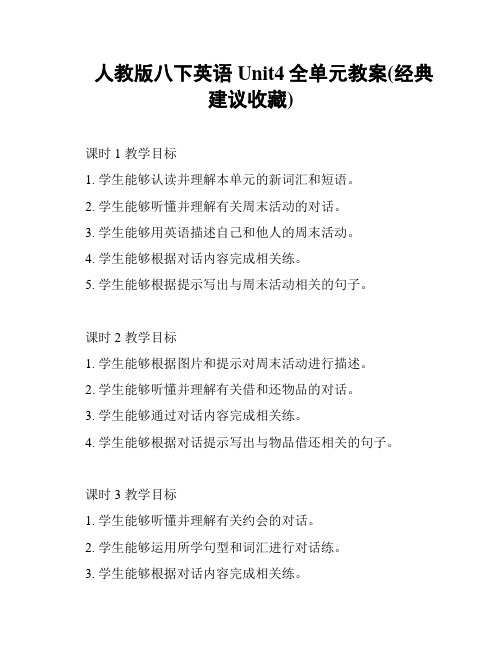
人教版八下英语Unit4全单元教案(经典建议收藏)课时1 教学目标1. 学生能够认读并理解本单元的新词汇和短语。
2. 学生能够听懂并理解有关周末活动的对话。
3. 学生能够用英语描述自己和他人的周末活动。
4. 学生能够根据对话内容完成相关练。
5. 学生能够根据提示写出与周末活动相关的句子。
课时2 教学目标1. 学生能够根据图片和提示对周末活动进行描述。
2. 学生能够听懂并理解有关借和还物品的对话。
3. 学生能够通过对话内容完成相关练。
4. 学生能够根据对话提示写出与物品借还相关的句子。
课时3 教学目标1. 学生能够听懂并理解有关约会的对话。
2. 学生能够运用所学句型和词汇进行对话练。
3. 学生能够根据对话内容完成相关练。
4. 学生能够用英语描述自己的约会经历。
5. 学生能够根据提示写出与约会相关的句子。
课时4 教学目标1. 学生能够听懂并理解有关邀请的对话。
2. 学生能够根据对话内容完成相关练。
3. 学生能够根据提示写出与邀请相关的句子。
课时5 教学目标1. 学生能够听懂并理解一篇有关暑假计划的短文。
2. 学生能够运用所学句型和词汇进行短文理解和书面表达练。
3. 学生能够根据短文内容完成相关练。
4. 学生能够用英语描述自己的暑假计划。
5. 学生能够根据提示写出与暑假计划相关的句子。
课时6 教学目标1. 学生能够运用词汇和句型描述日常生活中的活动。
2. 学生能够运用所学句型和词汇进行对话练。
3. 学生能够根据对话内容完成相关练。
4. 学生能够根据提示写出与日常活动相关的句子。
课时7 教学目标1. 学生能够听懂并理解有关节日庆祝的对话。
2. 学生能够用英语描述自己喜欢的节日。
3. 学生能够运用所学句型和词汇进行对话练。
4. 学生能够根据对话内容完成相关练。
5. 学生能够根据提示写出与节日庆祝相关的句子。
课时8 教学目标1. 学生能够听懂并理解有关健康惯的对话。
2. 学生能够根据对话内容完成相关练。
3. 学生能够用英语描述自己和他人的健康惯。
人教版英语八下_Unit 4 单元教案

Work on 3b:1. Ask Ss what’s the common problem for Chinese and American families?Ss: They have to go to many after-school classes.2. OK. What’s your opinion a bout after-school classes? Now think about it and write a short article about to a magazine.写作指导:本文为写自己对课后辅导班的看法,故应为议论文。
因此,人称为第一人称;时态应用一般现在时态;首先,应开门见山地描述课后辅导班这一社会现象。
然后,明确表明自己的看法,是支持还是不支持。
接下来再用表格中所给的句型结构,一一列举自己的想法或原因。
3. Ss try to write a short article by themselves.4. Walk around the class and give any help Ss may need.5. Let some Ss read their letters and correct them.PracticeOne possible versionI don’t agree with the idea of sending kids to after-school classes because all these activities can cause a lot of stress for children. It’s not good for a child’s development. In my opinion, kids should have time to relax and think for themselves, too. I think it’s better that parents shouldn’t compare their children with other children. It’s crazy and not fair.Production。
人教版八年级英语下册集体备课教案:Unit4 Why don’t you talk to your

课题课时Period 1教学目标语言技能听:能听懂他人他人陈述困难和麻烦的简单对话的内容,并获取主要信息。
说:1.能询问、陈述自己或他人的困难和麻烦,如What’s wrong?I’m really tired because I studied until midnight last night.2.能针对别人的困境提出解决的办法和建议,如What should Ido?Well,you should call him so that you can say you’re sorry.语言知识语音:熟练把握邀请句的升调语调,同时,在口语交流时能做到语音、语调准确、自然、流畅。
词汇:1.熟练运用:allow,wrong,midnight,guess,de al.2.掌握:What’s wrong, look through,work out.语法:1.能正确使用情态动词could,should表达或劝告,如:Youcould go to his house.2.能正确使用Why don’t you...?句型表达建议。
功能:学会询问、陈述自己或他人的困难和麻烦。
话题:了解人际交往的相关知识。
情感态度1.培养学生用英语交际能力,学会与人进行流畅的沟通和交流;2.使学生在活动中学会真诚、坦然地与人交谈。
学习策略认知策略:能在具体的情境中询问、陈述自己或他人的困难和麻烦,从而进一步主动练习和实践。
调控策略:.能针对别人的困境提出解决的办法和建议,并与人进行交流。
交际策略:培养学生合作能力,不断完善知识点,加强对话练习,学会与人闲聊,进行交流。
资源策略:通过多媒体、录音机等教学辅助工具。
文化意识了解中西方家长对待孩子参加课外活动和课外学习班的态度与做法。
教学重难点教学重点1.能正确使用情态动词could,should表达或劝告。
2.能正确使用Why don’t you...?句型表达建议。
教学难点1.Talk about problems.2.Give advice.教学方法听说法,交际法,教学辅助手段PPT, recorder.板书设计Unit4 Why don’t you talk to your parents?Sectio n A 1a-2dallow What’s wrong?wrong Why don’t you...?midnightguessdeal教后反思本节课学会了提建议的方式有:Why don’t you...? /Why not…?等Teaching ProcedureStages/TimingStep 1. warming-upStep 2 PresentationStep3 DiscussionStep 4Pre sentationStep 5 ListeningTeach ers’ a ctivitiesAfter greeting, ask students :What day is it today?What’s the date today?What’s the weather like today?1. Show the picture of a girl:T: Please look at this girl,what isshe doing?T: Look at her face,she isworried.because she has a lotof homework to do.Do yo uhave too much homework todo?Do you think it is serious?1a.Get them to read the followingsentences and discuss wheatherthey are serious or not. And thenwrite them in the approprite boxT:Do you have theseproblems?What kind of problemsdo you have?Students’ activitiesStudents answer the questions。
八年级英语下Unit4 教案2人教版

人教版英语八年级下Unit4 教案2Unit 4 He said I was hard-workingTopic: Telling a story.Key words: hard-working, report surprise party . be mad at soap opera Functions: Report what someone said.Structure: Reported speech Simple past tense; Can for abilityLearning Strategies: listening for key words; self- evaluating●教学重点、难点分析:Target language:What did your math teacher says?He said I was hard working.I can speak three languages.What did she say?She said she was having a surprise party.●课前准备教学课件和录音机●教师设计教学步骤建议和说明Step1(Warm-up/Revision)Free talkWhat were you doing at 8:00 last Saturday evening?(I was watching Tv/…)What kind of TV show do you know?Step2 Lead-inGet the students to look at the pictures carefully, make sure most of the students know what is happening in the pictures. Do activity 1a. Ask the students to read the questions and talk about them. Maybe the teacher can explain what a soap opera is. A soap opera is a drama, typically performed as a serial on daytime television or radio, characterized by stock characters and situations sentimentality, and melodrama. What is a soap opera?Do you ever watch soap operas?What are some soap operas you know?What are some things that happen on soap operas?Show students several soap operas.Step3 PresentationShow some pictures to teach reported speech Simple past tense He said he wanted to be the best student in his class.He said he would try his best to improve his English.The cat told the mouse they were good friends!He told the baby he was going to give him some milk!He said he could give these flowers to his mother !Step4 Listening1b. First Listen to the tape about Young Lives and number the pictures. Check answers.Then listen again. Listen and write T or F for each statement.1.Ben told Lana that Marcia was going to have a surprise party for her. T大脑风暴,打开学生思维,讨论soap opera为学习间接宾语做铺垫。
人教版英语八下 unit4 复习教案
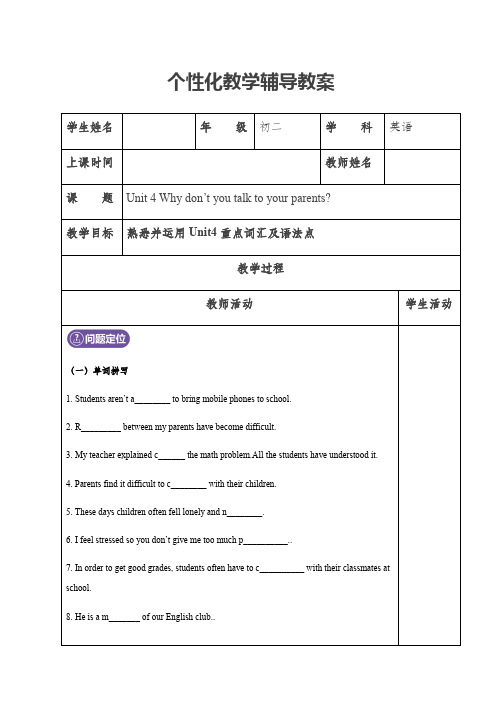
个性化教学辅导教案(一)单词拼写1. Students aren’t a________ to bring mobile phones to school.2. R_________ between my parents have become difficult.3. My teacher explained c______ the math problem.All the students have understood it.4. Parents find it difficult to c________ with their children.5. These days children often fell lonely and n________.6. I feel stressed so you don’t give me too much p__________..7. In order to get good grades, students often have to c__________ with their classmates at school.8. He is a m_______ of our English club..It ________(make) you feel calm if everything is in order before you sleep. So brush your _______(tooth), wash your face, open the window and go _______ bed. Your mind will take in all the cue(提示) that it’s time to go the land of dreams and you’ll be sleeping like a baby in no time.Go to bed when you’re tiredIf you’re feeling _______(real) tired, go to bed. Don’t stay up watch a late show, don’t try to do a bit ______ (much) work, and don’t plan to stay ______your friend’s place too late. Go to bed.Say yes to milkIf you want a bedtime snack, have something calming and ______ (sleep). A glass of warm milk will help to sleep better. And try not to eat a big meal too close to bedtime, which keeps you awake.Turn off the TVTV programmes make you ______(excit). Don’t watch anything for an hour before you go to bed. Listen to ______(relax) music instead! It will send you to sleep in no time at all. All the tips above ______(be) for a good night’s sleep. Your baby’s going to thank you very much for it.makes; teeth; to; really; more; at; sleep; excited; relaxing; are【知识梳理1】1.Why don’t you talk to your parents? 你为什么不和你打父母谈谈呢?【考点分析1】Why don't you do sth ?= Why not do sth? 为什么不......呢?Until:在带有till或until引导的时间状语从句里如果主句用肯定式,其含义是“一直到……时”,谓语动词只能用延续性动词。
人教版八年级英语下册Unit4SectionA3a—3c教案设计设计

⼈教版⼋年级英语下册Unit4SectionA3a—3c教案设计设计Unit 4 Why don’t you talk to your parents ?I. Teaching aims1.Aims of the knowledge(1)Let the students talk about the problems and give some advice to use the sentence W hy don’ t you do ...?(2)Make the students know the spelling of the new words and usage of the key words.(3)Make the students use the key words and make their own sentences.2.Aims of the abilities(1)Train the students to use the key words and express their thoughts.(2)Develop the students’ abilities of listening , speaking, reading and writing .3.Aims of the emotion(1)Make the students understand how to talk about problems and express feelings.(2)Make the students understand how to help others and get on well with others.4.Teaching keys and difficulties(1)Learn to use the sentence W hy don’ t you do ...?(2)Make the students master the new words communicate, communication ,explain, copy, deal, allow...and so on.(3)The students can make their own sentences and write a passage.II. Teaching methodsAs we all know , the teacher should use proper teaching methods in different classes. So according to learning background ,I will use the following methods:(1)Situational teaching method(2)Task-based language teaching method.III. Analysis of the studentsOur students are almost from the countryside, they are lack of knowledge and cultural background of the foreign countries and some students don’t like English, therefore, I will have students study in a relaxing atmosphere and encourage them to get over shyness , open their mouths to speak and take an active part in activities. IV. Teaching procedures.Step I. Leading-inLet's have a free talk .T: I hear the students from NO.18 Middle School are very friendly , you like helping others. So if my friends and I meet some problems , can you help us ?S: Yes(I will lead in to my new lesson in this way, the purpose is to arouse the students’interest in study.)Step II. PresentationI will show some pictures to the students, let the students guess what trouble he or she has and give them some advice. Lead the students to use the new words , phrases and the sentence W hy don’t you do ...?Picture 1.T: My friend Jimmy met a big problem, his parents don’t allow him to hang out with his friends. If I were Jimmy,what should I do ? Can you help me ?S: Why don’t you communicate with them ?Why don’t you have a communication with them ?...T: Please pay attention to allow , hang out , communicate , communication.Picture2.T: Look at the screen.W hat’s t he matter with Cathy ?S: She has too much homework.She studies too much.T: Maybe she has two problems.Can you tell me about her another problem?S: She has too many after-school activities.T: Please pay attention to too much and too many.Picture 3.T: What’s the matter with Bob?S: He is arguing with his friend. He is having a fight with his friend.T: If I were Bob, what should I do ?S: Why don’t you call him up and explain the thing clearly ...Pay attention to call, explain and explanation.Picture 4.T: What’s wrong with Tom?S: His friends are copying his homework.T: If I were Tom, what should I do ?SA: C opying others’ homework is wrong.SB: C opying homework isn’t a big deal.T: Pay attention to copy and deal.When the students answer my questions, I will write key words and phrases on the blackboard. Read the phrases and teach each key words carefully.NO1.allow1.My parents don’t allow me to hang out.2. The police allow parking here.NO2.communicate v.Why don't you sit down and communicate with your parents ?communication n.1. Have a communication with your parents.2. Mobile phones are important means of communication.NO3.deal---dealt---dealtv. 1. How do you deal with the problem?What do you do with the problem?n. 1. That’s a deal.2. It’s not a big deal.3. I have a great deal of work.NO.4explainv. explain sth to sbexplain a difficult problem to Tomn. explanation give a clear explanationNo.5copyv. copy the sentence downn. 1. I made four copies of the letter..2. Over one thousand copies of the books were sold out.After I explain all of the words and phrases, I will ask students to make their own sentences with the words. Divide them into some groups and have a competition, and find out which group can make more sentences.(The purpose of this step is to help the students understand the usage of the key words)Step. III Listening practiceListen and complete the passage.All the blanks are key words. I want to review the key words by listening practice . After listening twice , check the answers. And I will just show them the key words , ask students to make their own sentences by using any word they like. After that, ask the students to answer the question What problems does the boy have ?Ask the students to give him some advice.(The purpose of this step is to review the key words by listening practice )Step IV. WritingAt the same time, I will go on my next step---writing practice. I will give the students five minutes to write a short letter to the boy and give him some good advice using the words, phrases and sentences we have reviewed in class. And I will ask one student to come to the blackboard and let the students check his passage together. (The purpose of this step is to further practice the key words. )Step V. SummaryIn our daily life, we may meet some problems, we should try to communicate with others to solve the problems. On the other hand, we should try our best to help the people in need. In a word, Help others to enjoy yourself.Step VI. HomeworkI think homework is so important that students should practice English as much as they can in class or after class. It isnecessary for the students to do some exercises after class. So I give them homework: Ask your best friend what his problems are ? And give him or her some good advice. V. Blackboard design.Unit 4 Why don’t you talk to your parents ?Words Phrasesallow hang out , talk with sbcommunicate call sb upcommunication have a fight with sbexplain explanation get on well with sbcopy deal write a letter to sb。
人教版英语八下UNIT4教案

人教版英语八下U N I T4教案(总19页)--本页仅作为文档封面,使用时请直接删除即可----内页可以根据需求调整合适字体及大小--Unit 4 Why don’t you talk to your parents?Section A【知识导入】have to study too much so I don’t get enough sleep.(P25)(1) have to 句型: have to “必须,不得不做某事”,与must 相比更有一种“被迫的”意思,后接动词原形。
Example: I have to clean my room. (可能是妈妈要求我必须去清理,而我自己还并没有想去)I must clean my room.(是我自己认为必须要清理一下房间了)(2)too much 表示“太多”可以跟在动词后面,例如:work too much ,eat too much (这是too much 是作为一个副词修饰前面的动词)或者后面接不可数名词,例如:too much homework,too much money (这里too much 是作为一个形容词来修饰后面的不可数名词)Too much 在口语中也可以表示“太过分了,太不像话了”(3)Enough 表示“足够的,足够地,很多,充足”Enough 当作为副词时,要跟在动词或者形容词后面,例如:good enough,sleep enough;当作为形容词时,后面可以接名词,例如:enough water,enough time。
Enough!在口语中表示“够了”,通常是带有情绪的表达。
有少数情况下,enough可以作为名词,当后面跟的是个代词时,要加of,例如:We have had enough of you! 我已经受够你了。
parents don’t allow me to hang out with my friends.(P25)(1)allow sb to do 表示“允许某人去做某事”类似用法:permit sb to do sth 允许某人去做某事;agree ab to do ath 同意某人去做某事tell sb to do sth 告诉某人做某事;refuse to do sth 拒绝做某事(2) hang out当为hang sth out 时是表示挂出,例如:I want to hang my clothes out.我想把我的衣服挂到外面去。
- 1、下载文档前请自行甄别文档内容的完整性,平台不提供额外的编辑、内容补充、找答案等附加服务。
- 2、"仅部分预览"的文档,不可在线预览部分如存在完整性等问题,可反馈申请退款(可完整预览的文档不适用该条件!)。
- 3、如文档侵犯您的权益,请联系客服反馈,我们会尽快为您处理(人工客服工作时间:9:00-18:30)。
Unit 4 Why don 'tyou talk to your parents?教材解读本单元的中心话题是人际交往,与学生实际生活紧密相关,主要探讨当代中小学生所面临的种种压力和困境,并针对这些问题给予合理的建议。
通过学习本单元,学生应能询问、陈述自己或他人的困难和麻烦,能针对别人的困境提出解决的办法和建议。
语法部分主要是关于学生能正确使用情态动词could,should 表达建议或劝告,能正确使用Why don 'you…句型表达建议,能正确使用连词until , so that, although等。
通过学习本单元,学生应能反思生活中常见的家庭矛盾以及与家长、同学、朋友之间的沟通问题,并学会用正确的态度对待这些问题。
在本单元中学生还能了解中西方家长对待孩子参加课外活动和课外学习班的态度与做法,有利于学生学会换位思考,帮助他们逐步建立正确、积极的生活态度和价值观。
单元目标一、知识与技能1. 掌握重点词汇和短语:until,so that,although,look through,big deal,work out,get on with , cut out, compare …with , in one 'opinion2. 掌握重点句型:What'swrong? What'sthe matter? You could / should … Why don 't you … ?3. 培养听说读写各项基本技能同时注重培养在语境中猜测词意的能力。
二、过程与方法采用直观教学法、情景教学法、讨论、角色表演等方法,学习知识,培养能力,养成好习惯。
三、情感态度与价值观通过学习,了解生活、学习中常见的矛盾和困难,能合理表达自己的观点和看法,给别人提出合理的建议,逐步建立正确、积极的生活态度和价值观。
教法导航采用直观教学法,情景教学法,遵循以学生为主体的原则。
学法导航采用自主学习、小组合作、分角色表演等学习策略。
课时支配第1 课时:Section A 1a- 2d第2 课时:Section A 3a- 4c第3 课时:Section B 1a- 2e第4 课时:Section B 3a- Self Check课时教案第 1 课时Section A 1a- 2d教学目标一、知识与技能1. 能掌握以下单词:allow , wrong , guess, deal, work out2. 能掌握以下句型:①---W hat' s wrong?---I ' m reylltried because I studied until midnight last night.②You could give him a ticket to a ball game.③I think you should ask your pare nts for some mon ey.④Why don ' t you talk to him about it?3. 能了解以下语法:①能够运用所学知识谈论问题和困难、提出建议并作出选择;②能根据对方所提出的问题,给出一些合理的建议。
二、过程与方法采用直观教学法,情景教学法,小组讨论与交流来了解生活中、学习中常见的矛盾与困难以及提出合理建议。
三、情感态度与价值观培养学生良好的合作意识,鼓励学生大胆表达自己的想法和意愿。
正确认识生活中的一些困难,能采用正确的方式解决生活中的问题。
教学重点掌握提建议的重点句型:You should / could… Why don 'you…?教学难点能对别人的问题提出合理建议。
教法导航直观教学法,情景教学法。
学法导航独立思考,小组讨论,合作。
教学准备图片,多媒体。
教学过程Step 1 Greeti ngsGreet the stude nts as usual.Step 2 Warmi ng upShow some pictures and ask:What' s the matte/rWhat ' s wrong?S:He has too much homework to do.T: Does he like to do it?欢迎下载2S1: No, he doesn ' t. Because he doesn ' t have any free time to do things he likes.欢迎下载3Step 3 TalkingSay:In our daily life there are always many problems. Look at these problems. Do you think they are serious or not? Students discuss with their partners and try giving some advice.①I have to study too much so I don 't get enough sleep.②I have too much homework so I don 't have any free time to do things I like.③My parents don 't allow me to hang out with my friends.④I have too many after-school classes.⑤I got into a fight with my best friend.Step 4 ListeningT:Tell students to read the sentences in 1a again. Make sure they know the meaning of the sentences. Then play the recording for the students to listen and circle the problems they hear in 1a. Play the recording again. Check the answers with the students.Step 5 Pair workAsk a pair of students to read the conversation in the box. Then ask the students to work I pairs and use the information in 1a to make other conversations. Let some pairs act out their conversations.Step 6 Listening2a, Say:Peter has some problems. What advice does his friend give him? Fill in the blanks with could or should. Let students read the sentences in 2a. Play the recording for the students to listen and write the words in the blank. Play the recording again to check the answers.2b, Let students read the sentences below. Explain some main sentences for the students. Make sure they know the meaning of each sentence. Play the recording for the students to write the letters (a-e) next to the advice in 2a. Play the recording again to check the answers.Step 7 Pair workTell students to make a conversation using the information in 2a and 2b. Let one pair to read out their conversation first.e.g. A:What' s the matte,r Peter?B:I had a fight with my best friend. What should I do?A :Well ,you should call him so that you can say you 're sorry. B:But I don 't want to talk about it on thephone.Students act the conversation in pairs. Ask some pairs to act out their conversations. Step 8 Role-playStudents read the conversations and try to understand the meaning. Read the conversation after the teacher. Practice the conversation with their partner. Then let some pairs to act out the conversation. Explain some new words and main points in the conversation.1. big deal是英语中的一个固定搭配,表示“重要的事情或状况”,多用于非正式交流。
作否定用法时,常说It ' s nota big dea或It ' s no big deal表示说话人并不认为某欢迎下载4欢迎下载 5事有什么了不起。
e.g. ① There ' s a soccer game on TV this evening but I don ' t have to watch it. It ' s deal.今天晚上电视上有一场足球赛,但我不一定要看。
没什么大不了的。
② It ' s a big dealDavid , bigger than you know.这事挺重要的,戴维,比你所知道的要重要。
